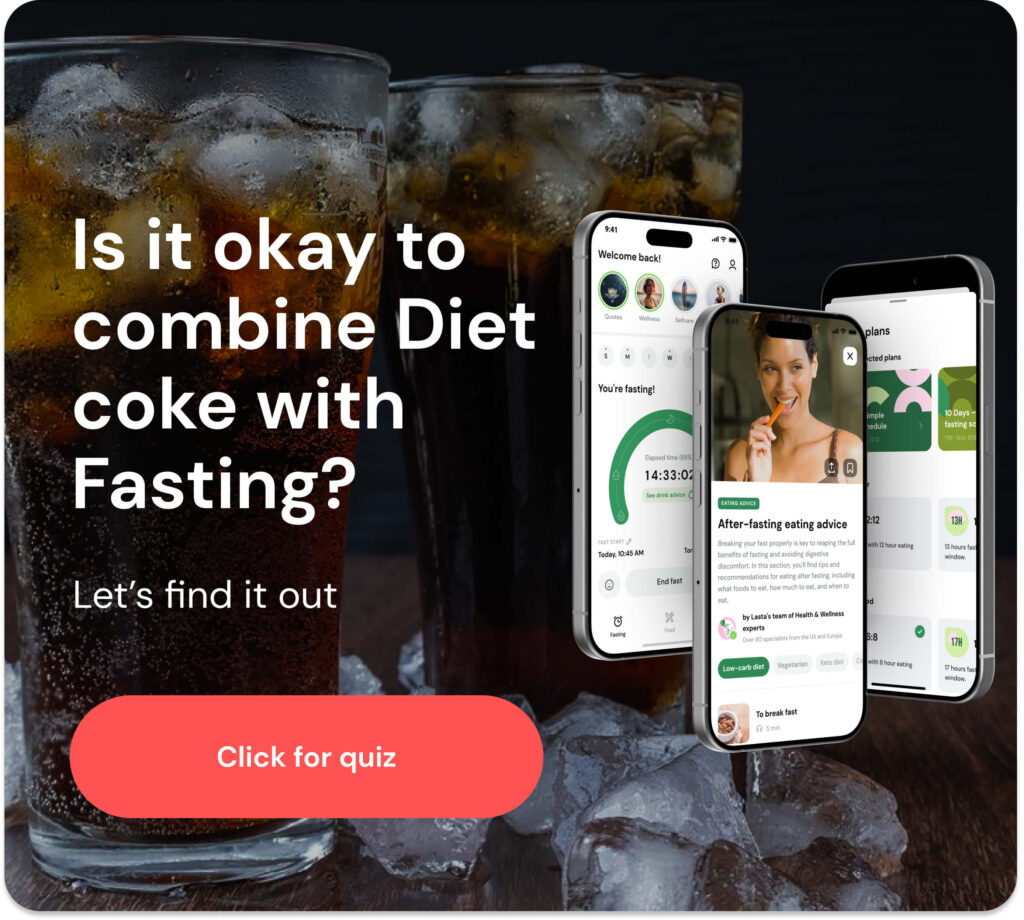Table Of Contents
The Fasting Dilemma: Can You Drink Diet Coke While Fasting?
Does Diet Coke break a fast? This question puzzles many intermittent fasters seeking to maximize their results while still enjoying favorite beverages. The answer isn’t black and white—it depends on your specific fasting goals and protocol. Some people fast with designated eating windows, while others follow more strict regimens abstaining from calories completely.
Understanding how diet sodas interact with your fasting state can help you make informed choices about what to drink during fasting periods. Let’s dive into the science and practical considerations to determine whether that fizzy, zero-calorie beverage truly disrupts your fast.
Zero-Calorie Temptation: Diet Soda’s Impact on Your Fast
Does diet soda break a fast? From a strictly caloric perspective, diet sodas contain virtually no calories, so they don’t break your fast in the traditional sense. However, the artificial sweeteners in these beverages might impact your fasting state in other ways.
Diet Coke and similar beverages contain artificial sweeteners like aspartame that may trigger certain metabolic responses. Research published in Oxford Academic suggests these sweeteners might stimulate insulin secretion in some individuals, potentially undermining some of the metabolic benefits of fasting.
While diet sodas provide hydration and caffeine that might help you stick with your fast, alternatives like black coffee or plain tea deliver similar benefits without the artificial additives. These natural options may better preserve the full spectrum of fasting benefits.
Diet Coke and Insulin: The Hidden Metabolic Response
When considering whether diet coke breaks intermittent fasting, we need to examine the insulin response. Though calorie-free, Diet Coke contains aspartame, which some studies suggest might trigger an insulin reaction in certain individuals. This matters because controlling insulin levels is a primary benefit of fasting.
Research from the National Institutes of Health indicates artificial sweeteners may potentially influence insulin sensitivity. The sweet taste might “trick” your body into preparing for sugar that never arrives, prompting a mild insulin release. This response varies significantly between individuals based on metabolism, gut microbiome composition, and insulin sensitivity.
For strict fasting purists focused on autophagy and maximum metabolic benefits, even this potential insulin response might be concerning enough to avoid diet sodas during fasting periods. For those primarily fasting for calorie control, the impact might be negligible.
Also, read – Science Behind Intermittent Fasting
Research Spotlight: What Science Says About Diet Soda During Fasting
Scientific studies examining artificial sweeteners present a complex picture. Research published in the American Journal of Clinical Nutrition suggests some sweeteners might influence glucose metabolism and appetite regulation. However, results vary widely across studies and individuals.
One study in Frontiers in Nutrition found that certain artificial sweeteners might affect the glycemic benefits typically associated with fasting. This suggests that while diet sodas don’t add calories, they might subtly interfere with some fasting mechanisms.
The research isn’t conclusive enough to make blanket statements about whether can you drink diet soda while fasting. Individual responses differ based on metabolism, gut microbiome composition, and specific fasting goals. What’s clear is that plain water, black coffee, and unsweetened tea remain the safest options during fasting periods.
The Artificial Sweetener Effect: How Aspartame Influences Fasting
Aspartame, the primary sweetener in Diet Coke, sits at the center of the fasting debate. Though it doesn’t contain calories, this sweetener might still affect metabolic processes relevant to fasting. The key question is whether it disrupts the beneficial metabolic state that fasting aims to create.
Studies from the National Center for Biotechnology Information suggest artificial sweeteners might influence the gut microbiome and potentially alter glucose tolerance in some individuals. The sweet taste without corresponding calories could confuse digestive signaling, potentially affecting hunger hormones and insulin sensitivity.
For those pursuing autophagy (cellular cleanup) during fasting, even minor metabolic disruptions could theoretically reduce benefits. If your fasting goals focus on longevity and cellular regeneration, you might want to avoid aspartame-containing beverages during fasting windows.

Sparkling Water vs. Diet Soda: Which Is Better During a Fast?
When comparing sparkling water and diet soda during fasting, plain sparkling water has clear advantages. It provides hydration and satisfaction without artificial sweeteners or additives that might potentially disrupt your fasting state.
Plain sparkling water contains only water and carbonation, making it virtually identical to regular water metabolically. The bubbles add a refreshing sensation that can help curb cravings during fasting periods without triggering insulin responses or other metabolic effects.
If you find plain sparkling water too bland, consider options with natural essences (not sweetened versions). Varieties with just a hint of citrus or berry essence can provide flavor without added sweeteners or calories that might compromise your fast.
- Plain sparkling water has zero calories and no sweeteners
- Carbonation provides satisfaction similar to soda
- Natural essence varieties add flavor without affecting fasting
- No concerns about potential insulin effects
Coke Zero and Fasting: Same Rules Apply?
Does zero sugar soda break a fast? Coke Zero, despite marketing differences, contains essentially the same artificial sweeteners as Diet Coke—primarily aspartame and acesulfame potassium. From a fasting perspective, these products raise identical concerns about potential insulin responses and metabolic effects.
The zero-calorie nature of Coke Zero means it doesn’t directly provide energy that would break your fast from a caloric standpoint. However, the artificial sweeteners still interact with taste receptors and might trigger metabolic pathways relevant to fasting.
For those pursuing strict fasting for autophagy and metabolic healing, even the theoretical possibility of sweeteners affecting insulin makes Coke Zero a questionable choice. If your fasting approach is more flexible and focused primarily on calorie restriction, occasional Coke Zero might not significantly impact your results.
Diet Pop Popularity: Why Fasters Reach for Zero-Calorie Drinks
Diet coke fasting has gained popularity for several practical reasons. Many intermittent fasters struggle with hunger during fasting windows, and the sweet taste and carbonation of diet sodas can provide psychological satisfaction without adding calories.
The caffeine content in many diet sodas also offers an energy boost during fasting periods when energy levels might naturally dip. This stimulant effect can make fasting more manageable and productive, especially for those new to the practice.
Additionally, transitioning from regular sodas to diet varieties during fasting represents a significant calorie reduction for many people. While purists might avoid all sweetened beverages during fasts, for many, diet sodas serve as a helpful intermediate step toward developing sustainable fasting habits.
- Sweet taste satisfaction without caloric intake
- Carbonation provides fullness sensation
- Caffeine offers energy during fasting windows
- Familiar flavor provides psychological comfort
Beyond Calories: How Diet Sodas Affect Your Fasting Goals
Fasting extends beyond simple calorie restriction—it aims to trigger specific metabolic states like ketosis, improved insulin sensitivity, and autophagy. Diet sodas might affect these deeper fasting benefits even while remaining calorie-free.
For autophagy—the cellular cleanup process that many pursue through fasting—even minimal insulin secretion might potentially reduce benefits. Studies suggest artificial sweeteners could influence metabolic pathways involved in this process, though research remains inconclusive.
For those fasting primarily for weight management, the potential minor metabolic effects of diet sodas likely won’t significantly impact results. However, if you’re fasting for longevity, cellular rejuvenation, or maximum metabolic reset, you might want to avoid all sweeteners during fasting windows.
Also, read – Addicted to Cola: Is Diet Coke Addiction Real?
Diet Coke’s Metabolic Impact: What Happens in Your Body
When you drink Diet Coke during a fast, several physiological responses occur. Your taste buds detect sweetness, potentially triggering a cephalic phase response—your body prepares for incoming nutrients by releasing digestive enzymes and hormones.
Research from Frontiers in Nutrition suggests this sweet taste without corresponding calories might create a temporary discrepancy in your metabolic signaling. Your brain receives the message “sugar incoming” while your digestive system receives zero actual carbohydrates.
The caffeine in Diet Coke stimulates your central nervous system and can temporarily increase metabolic rate—potentially beneficial for fat oxidation during fasting. However, this stimulant effect may also increase cortisol in sensitive individuals, which could theoretically impact fasting benefits.
Your Body’s Response to Diet Drinks During Fasting
Individual responses to diet drinks during fasting vary considerably. Some people report increased hunger after consuming artificially sweetened beverages, while others experience reduced cravings and find fasting easier with these zero-calorie options.
Research from the National Center for Biotechnology Information suggests these individual differences might relate to gut microbiome composition, metabolic health, and prior dietary patterns. Some people may experience more pronounced insulin responses to artificial sweeteners than others.
The psychological component shouldn’t be underestimated either. For those transitioning to intermittent fasting from a diet high in sweet beverages, diet sodas can provide familiar comfort that makes fasting sustainable. This psychological benefit might outweigh potential minor metabolic concerns for some individuals.
Not All Diet Drinks Are Created Equal: What to Know
The fasting impact of diet beverages varies based on their ingredients. Different artificial sweeteners have distinct metabolic effects—aspartame (in Diet Coke), sucralose (in some diet drinks), and stevia (in natural diet beverages) may affect insulin and blood sugar differently.
Additives beyond sweeteners also matter. Some diet drinks contain phosphoric acid, caramel color, and other ingredients that might affect digestive processes or trigger inflammatory responses in sensitive individuals. These reactions could potentially influence fasting benefits.
Diet beverages with natural sweeteners like stevia might theoretically have less impact on insulin than those with artificial options, though research remains limited. Similarly, carbonated flavored waters with no sweeteners likely have minimal impact on fasting compared to traditionally sweetened diet sodas.
- Different artificial sweeteners have varying metabolic effects
- Additional ingredients like acids and colorings may affect some fasters
- Natural sweeteners might have different impacts than artificial ones
- Unsweetened flavored options typically have minimal fasting impact
Sugar-Free Drinks While Fasting: The Complete Guide
When considering sugar-free options during fasting, the ideal choices have zero calories and no sweeteners. Plain water, black coffee, and unsweetened tea top the list of fasting-friendly beverages. These drinks support hydration without triggering significant metabolic responses.
For those seeking more flavor, herbal teas offer variety without compromising fasting benefits. Options like peppermint, chamomile, and hibiscus provide natural taste variations without sweeteners or calories that might impact your fasting state.
Sparkling waters represent a middle ground—they provide the carbonation sensation similar to soda but without sweeteners. Varieties with natural essences (not sweetened) can satisfy flavor cravings while maintaining the metabolic benefits of your fast.
Also, read – What Can You Drink While Fasting?
Tea vs. Soda Showdown: Better Options for Fasting
When comparing tea and diet soda for fasting periods, unsweetened tea offers clear advantages. Tea contains natural bioactive compounds like catechins and theanine that may actually enhance some fasting benefits rather than potentially interfering with them.
Research from the National Institutes of Health indicates certain tea compounds might support autophagy and improve insulin sensitivity—the very processes many seek to enhance through fasting. Diet sodas, by contrast, contain artificial ingredients that lack these beneficial properties.
The caffeine in tea tends to be released more gradually than in diet sodas, providing a more sustained energy boost without dramatic spikes and crashes. This gentler stimulant effect may better support the stable energy levels that make fasting sustainable.

Side Effects of Coke Zero During a Fast
Consuming Coke Zero while fasting may cause several side effects worth considering. The acidity can potentially erode dental enamel, especially when consumed frequently during fasting periods when saliva production may already be reduced.
Research published in the Journal of Oral Rehabilitation indicates carbonated beverages, even sugar-free ones, can significantly impact dental health due to their acidic nature. This concern may be heightened during fasting when protective food consumption is absent.
Some individuals report digestive discomfort, headaches, or increased cravings after consuming artificially sweetened beverages during fasting. The caffeine content may also affect sleep quality, which could indirectly impact the hormonal benefits of fasting by disrupting circadian rhythms.
- Potential dental erosion from acidity
- Possible digestive discomfort in sensitive individuals
- Caffeine-related sleep disruption
- Increased hunger or cravings in some people
Zero-Calorie Drinks You Can Actually Have While Fasting
For those seeking absolute clarity on fasting-approved beverages, here’s a definitive list of zero-calorie drinks that won’t compromise your fast:
- Plain water (still or sparkling) – The gold standard for fasting hydration
- Black coffee – Contains minimal calories and may enhance fat oxidation
- Unsweetened tea (green, black, herbal) – Offers variety without breaking your fast
- Apple cider vinegar (diluted) – May support fasting benefits with minimal caloric impact
- Water with electrolytes (without added sugars) – Supports mineral balance during extended fasts
These options provide hydration and some flavor variety without triggering significant insulin responses or disrupting the metabolic benefits of your fast. For those struggling with plain water, adding a slice of lemon or cucumber can enhance flavor without meaningfully impacting fasting.
Good-Choice Beverage Buffet for Intermittent Fasters
Create your personal fasting beverage strategy by selecting from these options, arranged from most to least ideal for maintaining fasting benefits:
- Tier 1 (Optimal): Plain water, mineral water, black coffee, plain tea
- Tier 2 (Good): Herbal infusions, diluted apple cider vinegar, water with lemon/lime
- Tier 3 (Acceptable): Bone broth (for modified fasts), coffee with minimal MCT oil
- Tier 4 (Questionable): Diet sodas, beverages with artificial sweeteners
The key is finding beverages that support your specific fasting goals while making the practice sustainable. If occasional Diet Coke helps you maintain longer fasting periods that you wouldn’t otherwise achieve, the net benefit might outweigh potential minor drawbacks, particularly if weight management is your primary goal.
Healthy Alternatives to Diet Coke While Fasting
If you’re looking to move beyond Diet Coke during fasting, consider these satisfying alternatives that better support fasting benefits:
- Sparkling water with citrus – Provides carbonation and subtle flavor without sweeteners
- Cold-brewed herbal tea – Offers refreshing taste with potential antioxidant benefits
- Cinnamon stick infused water – Natural sweetness perception without actual sweeteners
- Fresh mint water – Cooling sensation with digestive benefits
The transition from diet sodas doesn’t have to happen overnight. Try alternating your Diet Coke with these alternatives, gradually increasing the proportion of fasting-friendly options. Over time, your taste preferences may shift, making it easier to choose unsweetened beverages.
The Liquid Effect: How Different Beverages Impact Fasting Outcomes
Different beverages create distinct effects on fasting physiology. Water supports optimal cellular hydration without triggering digestive or hormonal responses, making it ideal during fasts. Its neutral pH and lack of additives maintain the cleansing aspects of fasting.
Black coffee and tea contain bioactive compounds that may actually enhance certain fasting benefits. Research published in Cell Metabolism suggests caffeine might support autophagy—the cellular cleanup process many seek through fasting. These beverages provide active compounds without meaningful caloric content.
Bone broth, while technically containing some calories, offers minerals that support electrolyte balance during extended fasts. Some fasting protocols specifically include bone broth to make longer fasts sustainable while still achieving significant metabolic benefits.
Diet sodas occupy a gray area—zero calories but potential metabolic effects from artificial sweeteners. The decision to include them depends on your specific fasting goals and individual metabolic response.
Diet Coke While Fasting: Making Informed Choices for Your Weight Loss Win
The decision about consuming Diet Coke during fasting ultimately depends on your specific goals and priorities. If you’re fasting primarily for weight management and calorie control, occasional diet sodas likely won’t significantly impede your progress, especially if they help you maintain your fasting schedule.
For those pursuing deeper metabolic benefits like autophagy, insulin sensitivity improvement, or maximum longevity advantages, avoiding all sweeteners during fasting windows aligns better with these goals. In these cases, stick with water, black coffee, and plain tea for optimal results.
Consider experimenting with different approaches. Try a week without diet sodas during fasting and note how you feel, then compare to a week where you include them. Your personal experience might reveal whether these beverages affect your hunger levels, energy, or fasting satisfaction.
Intermittent Fasting and Diet Soda: The Statistics
Understanding the numerical perspective helps frame the diet soda and fasting relationship. Most diet sodas contain effectively zero calories, compared to the 150+ calories in regular versions, according to My Food Diary database.
Research published in Nature indicates artificial sweeteners may influence insulin response in some individuals, though findings remain inconsistent across studies. This metabolic variability makes universal recommendations challenging.
Consumer data reveals widespread use of artificial sweeteners—approximately 41% of American adults and 25% of children reported consuming low or zero-calorie sweeteners between 2009-2012, according to studies published by the National Center for Biotechnology Information. This prevalence highlights the importance of understanding how these substances interact with fasting.
For most fasters focused primarily on weight management, the calorie-free nature of diet sodas likely outweighs potential minor metabolic effects. However, those pursuing therapeutic fasting for specific health conditions may benefit from avoiding all sweeteners during fasting windows.
Also, read – How Many Calories to Eat During Intermittent Fasting
Mary has a Master of Science in Nutrition and is a Registered Dietitian. Currently, Mary works in nutrition research. Her research interests focus on the dietary, biological, metabolic, or behavioral differences in individuals with obesity and other chronic conditions. Mary will begin her Ph.D. in nutrition in the Fall. In her free time, you will usually find Mary hiking, at Pilates or Yoga, cooking, or reading.









